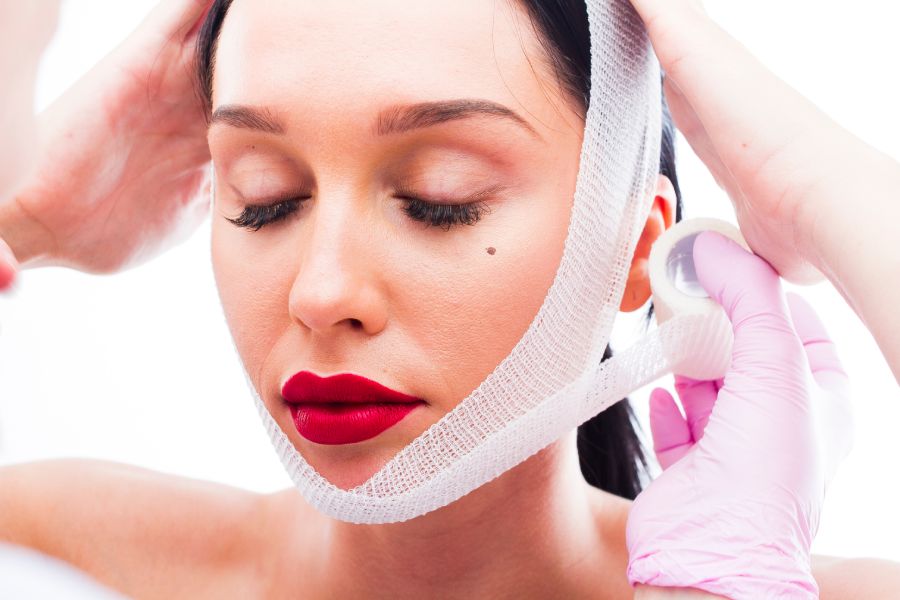Many people undergo a facelift procedure intending to look more youthful. The facelift surgery might smooth down wrinkles and ease visible signs of aging for both women and men. But how long does it take to recover from a facelift and to minimize the swelling?
Facelifts are possibly some of the easiest and fast-healing procedures. A facelift might last from three to five hours and requires patients to take their time to heal. Every work you get done on your face needs post-op time to recover.
For numerous people, getting a facelift is completely worth it. The recovery process is not overly difficult and long. In return, their faces appear smoother and a few years younger without any procedure scars.
If you are contemplating getting a facelift, keep reading to know what to expect and mentally prepare.

Source: shutterstock.com / Photo Contributor: Peakstock
How Long Does It Take to Recover From a Facelift?
Surgeons estimate the time of facelift recovery to last no more than one month. The initial four weeks after the facelift surgery are the most challenging, and patients frequently need time to heal fully. But hydration, rest, and daily activity may speed up the facelift recovery.
Post-Op Timeline of a Facelift
Most commonly, patients are put under general anesthesia during facelifts. The doctor makes incisions to remove fat and loose skin to tighten the patient’s face. After waking up, patients are immediately sent home to rest.
Once the procedure is done, let’s learn what comes next:
The first day: Your toughest battle
Usually, the first day after the surgery is reserved for doctor consultation. Doctors must examine your face the day after you get the facelift and advise you on healing techniques. But the first-day post-op trip to your doctor’s office may feel like a blur.
Many patients experience difficulty opening their mouths or having the appetite to eat anything on the first day. Your head may be wrapped around with secure gauze to prevent excessive swelling. But this pressure might be uncomfortable and cause painful headaches for some.
Your saving grace and sign of hope on the first day after you get a facelift might be medication. Take your pills regularly to save you the trouble of experiencing tremendous pain in your face. Once you get through this day, everything just becomes much easier.
Ensure you have emotional support during this time because you may need it. You might not want to face anyone for a few weeks, but a simple phone call with your friends or parents might remind you that things will eventually improve.
Week 1: Swelling
The second day after you get the facelift surgery, you may have more energy to stand up and move around the house. If you have face drains, they might be removed during the first week. When resting, place a comfortable and raised pillow under your head. This might help the swelling go down.
By day four, you might not need medication anymore. But you may still be able to see some swelling on your face. This is completely normal; the swelling might decrease after the first-week post-facelift.
Week 2: Soreness
In week two, you will notice that your face is not as puffy anymore. But it may still feel sore and cause discomfort when trying to perform facial expressions. Bruising on your face might also be present during the second week. However, bruising is a part of the normal facelift recovery, and it’s no point for concern.
Week 3: Minimal scarring
By this time, you might get frustrated and impatient, constantly asking yourself, how long does it take for a facelift to heal? Your sutures on week three should be removed. But underneath, there might be some scarring.
Don’t panic since this is a common experience for many. Your face at this stage is very vulnerable since the incisions are exposed and left to heal naturally.
Week 4: Slight tingling
The results from your facelift surgery may be visible in week four. By this time, you shouldn’t feel any pain, only a slight tingling on your face. This is a sign of the swelling fading and your skin healing to appear restored and youthful.

Source: shutterstock.com / Photo Contributor: fizkes
Is One Month Enough to Recover From a Facelift Fully?
The real results of a facelift are visible after 12 months of getting the surgery. During the first year, your face might be healed but still swollen in some places. However, the pain, bruising, and tingling will likely disappear after one month of surgery.
Now you know what it takes and how long to recover from facelift procedures. For some, the healing process may last more than a month. It all depends on your skin condition and the intensity of the facelift surgery.
Don’t get discouraged if you see some bruises even after a whole month passes. Your skin may need some extra time to restore and feel healthy again.

Source: shutterstock.com / Photo Contributor: Yuliya Loginova
Can You Speed up the Facelift Recovery?
It’s also important to know some things you can do to speed up the process, in addition to knowing how long does it take to recover from a facelift? They are mainly forms of self-care you need to take to feel more energized and healthy during recovery.
Paying attention to the below-mentioned tips may help you feel better while taking care of your health. Remember that your well-being should be your number one priority.
Taking care of your mental health is as important as physical activity during facelift recovery.
You Might Be Interested: The Ugly Truth: What Makes a Bad Facelift and How to Prevent It
Hydration is key
Your body might heal faster if you drink a lot of water. The same applies to post-op recoveries. Even if you get a facial procedure, your entire body goes through trauma. Thus, hydration may be crucial for speeding up the facelift recovery and promoting energy revival.
Rest is healing
You will likely feel tired after getting a facelift surgery. Especially the first week after the procedure, your energy levels may be lower than usual. Therefore, ensure you get enough sleep and rest throughout the day that may help you rapidly heal.
Stay active
Getting surgery doesn’t mean spending a month in bed doing nothing. Instead, being active a little and moving your body may accelerate healing as well as make you feel productive. Ensure you take short walks or do simple chores around the house daily.
However, remember not to lift heavy things during recovery.
Eat fiber
Maintaining a healthy diet during facelift recovery is more important than most people think. It’s very common for many to experience irregular bowel movements after facelift surgery. So, ensure to eat fiber every day to prevent constipation.
Implement proper hygienic care
Doctors must give clear instructions to their patients regarding hygienic care. Your face’s incisions must be regularly cleaned to avoid infections and unwanted complications.
Proper care of the wounds on your face also involves keeping them dry at all times.
Seek professional assistance
Some patients prefer doing more work on their faces simultaneously to avoid going through the recovery process multiple times. A facelift procedure might be done with an eyebrow lift or the implementation of facial implants.
Luckily, a reputable healthcare service can guide you through the process and expected outcomes. Multiple procedures at once may prolong the recovery process, so consulting a medical professional is your best bet.
What to Avoid During Facelift Recovery
For now, you must let go of some bad habits to ensure your facelift recovery goes smoothly. Also, medications won’t solve all your problems. They might ease the pain in your face, but if you expose your skin to direct sunlight, the surgery results will not be quickly visible.
Thus, consider the things below to ensure you do everything possible to heal properly and, more importantly, see results faster!
Sun exposure
The negative effects of sun exposure on your skin are well-known. The powerful sun rays may severely damage your skin due to direct exposure, especially when you have just undergone facial surgery.
Always apply sunscreen on your face when going out to prevent the recovery process from slowing down.

Source: shutterstock.com / Photo Contributor: verona studio
Overmedication
Painkillers during the first few days after facelift surgery are normal to consume. Nonetheless, taking an excessive amount of medication aiming to prevent the pain is a huge mistake many make.
Always take the recommended dose of medicine prescribed by your doctor. Additionally, don’t combine painkillers with other medications to prevent complications and slow recovery.
Alcohol and cigarettes
Doctors advise their patients to stop smoking and drinking before they undergo facelift surgery. The same rule applies after surgery. Alcohol and cigarettes might dry out your skin, causing a slow-moving healing process.
Conclusion
How long does it take to recover from a facelift? We did our best to help you learn. However, we always recommend consulting a medical professional before you make your assumptions. Healthcare providers should inform you about the recovery duration and preventative care.
The best thing you can do for yourself after getting a facelift is to prioritize your health. Take all the time you need to heal, and you may be ready to go back to work and perform your usual activities only after a month of getting the facelift surgery!
